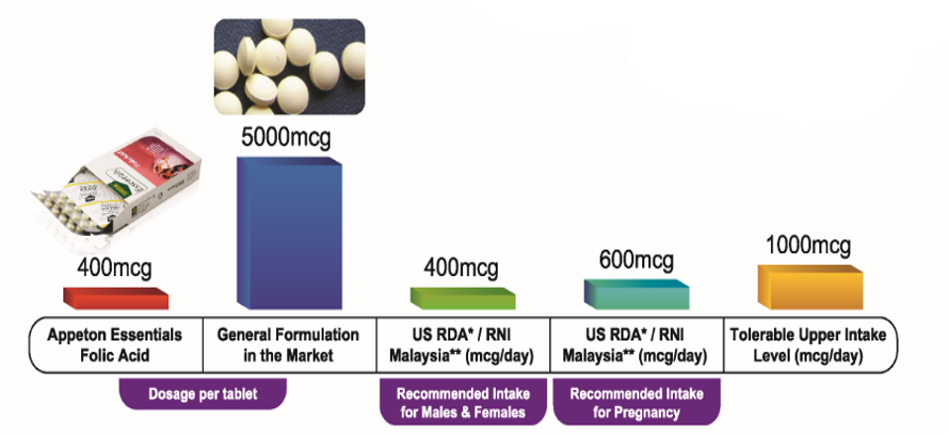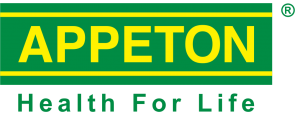Folic Acid and Pregnancy: Less is More for a Healthy Start
Every newlywed couple dreams of having a healthy baby, and planning for a healthy pregnancy starts with proper nutrition. Folic acid is crucial during the early stages of fetal development, particularly in forming the neural tube, which eventually becomes the brain and spinal cord. Taking folic acid before and during pregnancy can significantly reduce the risk of neural tube defects (NTDs), such as spina bifida and anencephaly, by up to 70%, helping to ensure a healthy start for your baby.1

Health organizations, including the Centers for Disease Control and Prevention (CDC), recommend a daily intake of 400mcg of folic acid for women of childbearing age. This amount is well below the Upper Limit (UL) of 1,000mcg per day, making it a safe and effective dose.2 It is important to note that the higher dose of 1,000mcg is only recommended for women with specific conditions, such as anemia or a previous history of a baby affected by NTDs.3 For most women without these risk factors, the ideal daily dose remains 400mcg, providing adequate protection without the risks associated with excessive intake.
For most women, taking 400mcg a day offers all the benefits of folic acid without the risks of higher doses. This amount is sufficient to prevent NTDs, support healthy red blood cells, and promote overall well-being during pregnancy. Incorporating folic acid into a pre-pregnancy routine is simple and safe when following the recommended 400mcg dose, which is enough to ensure a healthy start to pregnancy.
However, it is nearly impossible for women of childbearing age to get the recommended 400mcg of folic acid entirely from food sources alone. Natural dietary sources of folate, typically is insufficient in providing the necessary amount. In fact, research has shown that nearly all women studied (97.5%) had a total dietary folate intake below the recommended levels for pregnancy and breastfeeding set by the World Health Organization (WHO).4 Therefore, supplementation is crucial to bridge this gap and ensure both mother and baby receive adequate folic acid for healthy development.
Appeton Essentials Folic Acid offers a convenient solution with its 400mcg dosage, complying fully with the United States Recommended Dietary Allowance (USRDA) and Malaysia Recommended Nutrient Intakes (RNI). Suitable for daily consumption, it helps reduce the risk of NTDs while supporting normal fetal growth. Small and easy to consume, it is recommended to be taken three months prior to conception, making it ideal for women planning or in the early stages of pregnancy. Start your journey to a healthy pregnancy with the right amount of folic acid, because every microgram matters.


Learn more: APPETON ESSENTIALS FOLIC ACID
References:
- Wald NJ. Folic acid and neural tube defects: Discovery, debate and the need for policy change. J Med Screen. 2022 Sep;29(3):138-146. doi: 10.1177/09691413221102321. Epub 2022 Jun 23. Erratum in: J Med Screen. 2022 Sep;29(3):147. doi: 10.1177/09691413221117464. PMID: 35735352; PMCID: PMC9381685.
- Santos, Quenia dos; Sichieri, Rosely; Marchioni, Dirce Maria Lobo; Verly Jr, Eliseu . (2013). Avaliação da segurança de diferentes doses de suplementos de ácido fólico em mulheres do Brasil. Revista de Saúde Pública, 47(5), 952–957. doi:10.1590/S0034-8910.2013047004769
- Adams, J.B., Kirby, J.K., Sorensen, J.C. et al. Evidence based recommendations for an optimal prenatal supplement for women in the US: vitamins and related nutrients. matern health, neonatol and perinatol 8, 4 (2022). https://doi.org/10.1186/s40748-022-00139-9
- E G O’Malley, S Cawley, R A K Kennedy, C M E Reynolds, A Molloy, M J Turner, Maternal anaemia and folate intake in early pregnancy, Journal of Public Health, Volume 40, Issue 3, September 2018, Pages e296–e302, https://doi.org/10.1093/pubmed/fdy013
